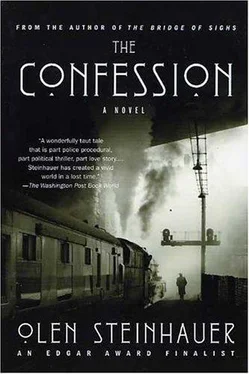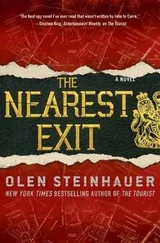Olen Steinhauer - The confession
Здесь есть возможность читать онлайн «Olen Steinhauer - The confession» весь текст электронной книги совершенно бесплатно (целиком полную версию без сокращений). В некоторых случаях можно слушать аудио, скачать через торрент в формате fb2 и присутствует краткое содержание. Жанр: Политический детектив, на английском языке. Описание произведения, (предисловие) а так же отзывы посетителей доступны на портале библиотеки ЛибКат.
- Название:The confession
- Автор:
- Жанр:
- Год:неизвестен
- ISBN:нет данных
- Рейтинг книги:5 / 5. Голосов: 1
-
Избранное:Добавить в избранное
- Отзывы:
-
Ваша оценка:
- 100
- 1
- 2
- 3
- 4
- 5
The confession: краткое содержание, описание и аннотация
Предлагаем к чтению аннотацию, описание, краткое содержание или предисловие (зависит от того, что написал сам автор книги «The confession»). Если вы не нашли необходимую информацию о книге — напишите в комментариях, мы постараемся отыскать её.
The confession — читать онлайн бесплатно полную книгу (весь текст) целиком
Ниже представлен текст книги, разбитый по страницам. Система сохранения места последней прочитанной страницы, позволяет с удобством читать онлайн бесплатно книгу «The confession», без необходимости каждый раз заново искать на чём Вы остановились. Поставьте закладку, и сможете в любой момент перейти на страницу, на которой закончили чтение.
Интервал:
Закладка:
“That takes a lot of work.”
“Arrested twice since for public drunkenness and fistfighting. Overnight stays.”
“And you need a reason for him to kill himself?”
Stefan stared through the page. “I guess I do.”
I noticed Leonek in the corner, at the coatrack, putting on his jacket to leave. He was a way out of this pointless conversation, so I did it, beginning something that would unravel so much. I asked Stefan to wait a moment, then went over to Leonek and told him I was sorry about his mother.
He looked surprised. “Thanks, Ferenc.”
“Come over for dinner. Okay? Tomorrow night.”
“Thanks, but no.”
“Really.” I put a hand on his arm to make my sincerity clear. “Magda’s a good cook, you’ll thank yourself for it.”
He shook his head again, his leathery Armenian face looser and more lost than I’d seen it before, his dark eyes drifting. But he was considering it, I could tell.
“Six o’clock, okay? We’ll leave from here, go get a drink, and be there in time to eat. It’s settled.”
“Why’d you do that?” Stefan asked when I returned.
“He just looks terrible.”
“He’ll work through it.” Stefan spoke with that same cold edge I’d heard earlier. Then he went back into the details of Josef Maneck’s miserable life, but by then I wasn’t listening to a word.
Mikhail Kaminski left with Brano, loudly describing the glories of Moscow nightlife, and Emil and Moska left together. Stefan asked if I wanted a drink. I said no. “You want to get right back to her, do you?” He smiled. “Come on, spend some time with your oldest friend for once.” But it wasn’t going to work. I was stuck in thoughts of Leonek’s dead mother, and of those days, long ago, in dark bars like the one we’d visited. After Stefan sighed and left, I called home.
“Hello, Daddy.”
“How was your day?”
“What day?”
“Don’t give me that.”
Agnes sighed. “It was satisfactory, Daddy. Very satisfactory.”
“Your teachers? How are they?”
“Too soon to tell.”
“And your friends? Are all of them still around?”
“You don’t even know my friends.”
I knew a few, but it didn’t matter. “Your mother there?”
“She’s downstairs, talking to that old woman again. Claudia. Want me to get her?”
“Just give her a message, okay?”
“I suppose.”
“Tell her we’re having a guest for dinner tomorrow. Can you do that?”
“When should I tell her you’re coming home? She always asks.”
“I’ll be,” I began, then realized I didn’t know. “Tell her I’ll probably be late. There’s a lot of work backed up here.”
“I’ll tell her.”
From her tone it was clear that Agnes saw right through me.
I sat straight in front of the typewriter. I’d rolled in a white sheet, twisted my ring, and now I waited for something to come. After a while, though, it was too dark to see.
10
I knocked on Georgi’s door after having walked down to the Tisa, trying to summon inspiration from the black water. The summer heat had brought out the smell of decay, and when the clamoring noise of a dogcatcher’s van filled with its barking victims flew by, the stink became too much.
Georgi let out a rude exclamation, kissed my cheeks with his wine-stained lips, and pulled me inside. His face was red, and the smile lines that sprouted from his eyes were white. “Have you met Louis? He’s leaving tomorrow! Come on, come on.” There were a lot of voices coming from the kitchen.
“Louis?”
“The Frenchman.” He reached up to my shoulder and urged me along.
They were up at this hour because they were always up-this is something they prided themselves on-ten or twelve men and women squeezed around a tiny kitchen table, drinking. Louis, the Frenchman, was in town, and everyone had made the pilgrimage to Georgi’s to see this emissary from the West. I’d forgotten.
“Louis!” Georgi called, and a fat man with oily, tasseled hair rolled his head back.
“Oui?”
“Mon ami” said Georgi. “Meet another of our writers!”
“This is a nation of writers!” Louis shouted, then rose wearily to his feet and stuck out a hand. “ You’re a big writer.”
He gave the kind of firm, rough shake men give when they consider my size, then turned my hand so he could see my rings, my sentimental reminders of the war.
“Each finger, huh?” Louis grinned as he settled back down. “I bet those rings have got some stories to them. Writers! ”
It was a kitchen of writers-Karel and Vera, Daniel, even Miroslav, and more-and I wanted none of them. All I’d wanted was Georgi, a quiet talk, and then some sleep. But Georgi couldn’t do anything quietly tonight. His Frenchman was in town. His French communist poet-an existentialist, no less.
The Frenchman sat up and said a few words of a love poem by Paul Eluard that I did not understand, something about wasps flowering and a necklace of windows. When he paused long enough we knew he was done, so we clapped. He beamed. Karel got up, and I took his chair. Louis said, “Now that you’re sitting I can face you!”
Vera and Ludmila laughed, and when they quieted, I saw Vera’s big, drunken eyes holding on to me. Her black hair hung loosely down her back.
“They told me about it,” he said. “This book of yours.”
“Oh great.”
“I hear it’s autobiographical. That so?” He spoke our language surprisingly well.
“Everything’s autobiographical, isn’t it?”
Louis laughed expressively, as though he were on a stage and had to project to the back rows. “Very good, very good!”
I hadn’t said it to be funny, but they were all laughing with him, even Georgi, and I didn’t know if this was because it actually was funny, or if they were trying to stay in France’s good favors.
“I just finished an epic poem on the most glorious of all human desires: revenge. I swear, there is nothing more sincere. What about your book?”
“It’s about my time during the war.”
The Frenchman stopped laughing and put on a very serious face. “And what did you do during the war?”
“Killed people, of course.”
Louis winked. “Me, I hid under my mother’s skirt!”
Everyone laughed again, and even I cracked a smile.
11
The conversation was literary before it became political. It started with some French poets I hadn’t read, then some Italians I’d read in translation, and finally came back home. Karel, Vera’s husband, brought up August Menish, who had been released from internal exile two months before and was busy editing his prison memoir. “It’s going to be incredible,” he told us.
“That’s what you told us about Brest’s camp book,” Vera said as she put out her cigarette. “And that ended up worthless.” The smile on her gaunt philosopher’s face was directed at me.
“Menish has the books behind him-he’s got the evidence,” said Karel. But no one was listening to him anymore.
Louis talked about the bus strike going on in Montgomery, Alabama, in the United States. A couple people waved his comments away, because we’d heard enough of the story from The Spark — further evidence of capitalism’s racist underbelly-but Louis insisted that we listen. “You should hear this reverend they’ve got leading them. His name’s King — a doctor, in fact. He’s one hell of a speaker. He’s putting nonviolent resistance on the map.”
“That was Gandhi,” said Ludmila. “The Americans would have you think they invented water next.”
“Didn’t they?” said someone I didn’t know.
Miroslav pulled out a pack of cards to start the games, so I moved to the deflated sofa in the living room and half listened to Vera provoke Louis into a debate on existentialism-she questioned his credentials, which was something Vera loved to do. I stopped listening. On the far wall was Georgi’s old poster for the Fifth Soviet Five-Year Plan, of kerchiefed women working in fields, below the enormous face of Stalin filling the sky, a chalk-scribbled beard over his wide chin. Georgi had been drunk when he defaced it, and everyone over that night-myself included-had applauded.
Читать дальшеИнтервал:
Закладка:
Похожие книги на «The confession»
Представляем Вашему вниманию похожие книги на «The confession» списком для выбора. Мы отобрали схожую по названию и смыслу литературу в надежде предоставить читателям больше вариантов отыскать новые, интересные, ещё непрочитанные произведения.
Обсуждение, отзывы о книге «The confession» и просто собственные мнения читателей. Оставьте ваши комментарии, напишите, что Вы думаете о произведении, его смысле или главных героях. Укажите что конкретно понравилось, а что нет, и почему Вы так считаете.












